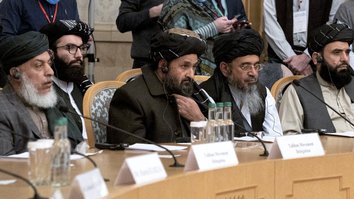DOHA -- More than a dozen diplomatic missions in Afghanistan on Monday (July 19) called for "an urgent end" to the Taliban's military offensive, saying it was at odds with claims that the militants want a negotiated settlement to end the conflict.
The statement -- signed by officials from the United States, European Union and over a dozen other missions in Kabul -- follows another round of inconclusive talks in Qatar over the weekend between the Afghan government and the Taliban that many hoped would kick-start the ailing peace process.
"The Taliban's offensive is in direct contradiction to their claim to support a negotiated settlement," it read.
"It has resulted in loss of innocent Afghan lives, including through continued targeted killings, displacement of the civilian population, looting and burning of buildings, destruction of vital infrastructure and damage to communication networks."
For months, the two sides have been meeting on and off in Doha but have achieved little, if any, notable success -- with the discussions appearing to have lost momentum as the Taliban unleashed a brutal offensive and as foreign forces started their final withdrawal due to be complete by the end of August.
A joint statement released late Sunday said little more than they had agreed on the need to reach a "just solution" and to meet again "next week".
During the summit in Doha, Taliban supreme leader Mullah Haibatullah Akhundzada released his own statement saying he "strenuously favours" a political settlement -- even as the hardline Islamist movement continues its offensive across Afghanistan.
Despite coming days ahead of the Eid ul Adha holiday, due to start Monday, Haibatullah's statement notably made no mention of a formal call for a ceasefire.
Over the years, the Taliban have agreed to a series of short truces during Islamic holidays, initially spurring hopes for a larger reduction of violence.
However, the group has been criticised for using the temporary ceasefires to resupply and reinforce their fighters, allowing them to launch attacks once the truce expires.
Oppression
The Taliban appear to be operating under an effective chain of command and carrying out complex military campaigns despite rumours of splits within their leadership.
But questions remain over how much control the Taliban's leaders have over commanders on the ground and on whether they will be able to convince them to abide by a potential agreement if signed.
Rather than demonstrate their commitment to peace and development, the Taliban have seized hundreds of rural districts and key border crossings.
In areas newly under Taliban control, the insurgents are enforcing oppressive measures reminiscent of their harsh rule from 1996 to 2001.
Days after the Taliban captured a remote district in Kunduz province, they issued their first orders in the form of a letter to the local imam.
It barred women from leaving their homes without a male chaperone, men from shaving and anybody from smoking and warned that anybody violating the rules "will be seriously dealt with", said Sefatullah, 25, a resident of Kalafgan district.
The Taliban also forced local leaders to provide lists of young women to marry off to the group's fighters, according to local residents.
Meanwhile, pro-government forces have conducted 244 operations, killing 967 enemy fighters -- including key commanders, said a spokesman for Afghan security forces, without specifying the time frame of those operations.
"We have recaptured 24 districts so far; our goal is to retake all the territories... We are ready to defend our country," Ajmal Omar Shinwari said Sunday.

![Chairman of the High Council for National Reconciliation Abdullah Abdullah (second from left) and Taliban deputy leader Mullah Abdul Ghani Baradar (far right) are seen July 18 on the second day of Afghan peace negotiations in Doha, Qatar. [Abdullah Abdullah/Facebook]](/cnmi_st/images/2021/07/19/30782-abdullah-585_329.jpg)







Afghan political leaders should refrain from their differences and should think about bringing peace to the country. The time for peace has come and they should establish an inclusive government along with the Taliban.
Reply2 Comment
It is a great pity that Afghans have been fighting among themselves for 43 years. If Afghans were united and were not fighting among themselves, now Afghanistan would have been considered the most developed country in Asia. Afghanistan has the best climate. Afghanistan has a lot of oil, gas and gemstone mines. Youths make up more than 80% of Afghanistan's population. Afghans are physically stronger than the people of other countries. Afghans have great talents. The only problem afflicting these people is lack of unity and solidarity. Afghanistan is a large country with a population of around 35 million, but its people are starving. Please be awakened. Don’t kill one another. I call on the Taliban not to fight against the Afghan security forces. They should come and enter politics through peace and reconciliation and save the country from poverty and helplessness.
Reply2 Comment